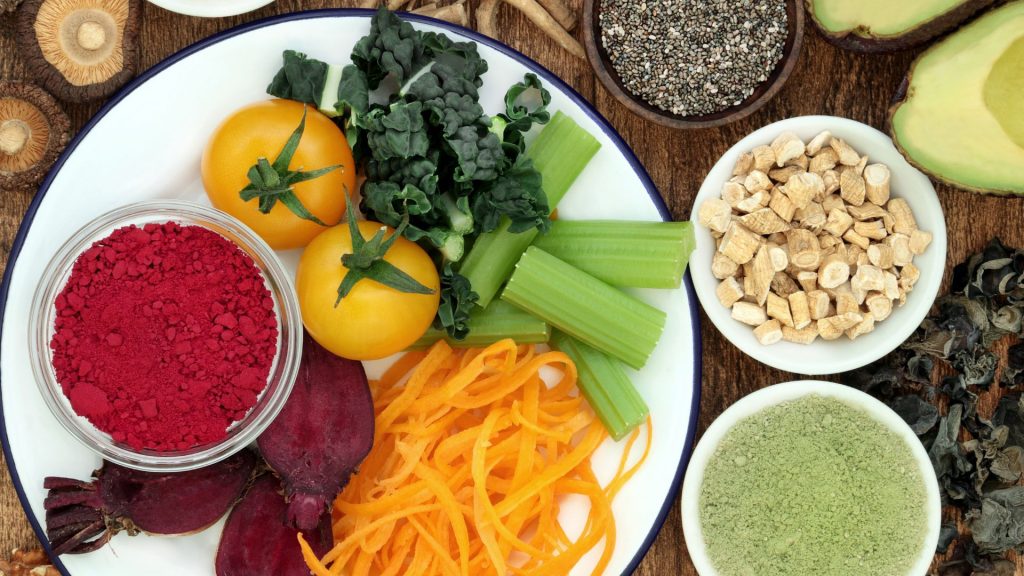Functional foods have quickly become the darlings of the nutritional industry. These whole, fortified, or enriched foods offer health benefits beyond basic nutrition; typically with bioactive components that exert physiological effects to increase well-being and health while decreasing chronic disease risks and/or improving disease outcomes (4).
Keep in mind, however, that just because a food is functional does not mean it is healthy – be sure to consider its Nutrition Facts label and ingredients list when making decisions about which options are appropriate for you.
1. Berries
Berry foods like strawberries, cranberries, blueberries and raspberries contain powerful antioxidants which provide numerous health benefits including immune support, lower blood sugar levels and even the prevention of certain cancers.
These foods are minimally processed, whole foods that can provide numerous health benefits when eaten regularly. Some of them can even be fortified with extra nutrients or be nutritionally enhanced to further maximize their effect.
Restaurants that highlight fresh, local or rare ingredients can capitalize on this trend by including functional foods in their menus. When adding functional foods to the menu, it’s important to consider your clientele; diners who predominantly seek fast food might not appreciate having Peruvian camu camu or goji berries on their sliders. A registered dietitian can assist in developing a healthful eating plan that includes functional foods. Alternatively, reach out to your local foodservice industry association for additional guidance in this matter.
2. Broccoli
Cruciferous vegetables contain many anti-inflammatory and antibacterial compounds, such as glucosinolates, phenolics, vitamins A-K. Furthermore, it’s packed with calcium, potassium magnesium and chromium – making cruciferous vegetables an invaluable addition to a balanced diet.
Studies have demonstrated that sulforaphane, an enzyme-inducing compound found in broccoli, may reduce cancer risk by activating antioxidant genes and protecting lungs against pollution-induced oxidative stress while protecting eyes from possible damage.
Fermented broccoli stalk slices served with and without mustard dressing were found to achieve high sensory quality scores for flavor, texture, aroma, acceptability and nutrient content. Lactobacillus sakei subsp. carnosus bacteria in combination with mustard dressing increased phenolic compounds and antioxidant capacity significantly; suggesting broccoli could serve as an innovative functional food to promote circular economies; its anti-inflammatory and antibacterial properties could aid in treating conditions such as IBD.
3. Garlic
Garlic is well-known to help combat common colds, heart disease and vampires (ok, maybe not the latter!). A kitchen staple, garlic complements many proteins like fish, chicken and lean meat as well as plant-based dishes perfectly.
Indeed, lemon garlic paste can also be used to spice up many pasta dishes like this Lemon Garlic Pasta with Salmon or this simple and delectable Aglio e Olio dish.
Functional foods are defined as foods that provide more than fundamental nutrition, helping to lower the risk of diseases such as diabetes, cardiovascular disease or cancer. This category can include natural ingredients as well as fortified or enhanced products (like those enriched with Vitamin D), or those specifically designed with genetic traits to increase their carotenoid content such as purple or gold potatoes that provide increased carotenoid content.
4. Turmeric
Turmeric’s health benefits can be harnessed through functional foods that incorporate curcuminoid-rich extracts produced through green extraction technology. Curcuminoids have been proven to lower cardiovascular risk as well as prevent and manage diseases.
Most functional foods are plant-based, such as berries, vegetables and spices such as turmeric. But animal products like fatty fish and organ meats may also qualify as functional food options.
Functional foods generally provide essential vitamins and minerals necessary for good health. They may also contain nutrients such as omega-3 fatty acids, dietary fiber, probiotics, which all play an integral part in overall wellness. Fortifying or enriching certain functional foods with additional nutrients to enhance their nutritional profiles–for instance adding calcium to milk–or providing them with additional nutrient-rich additives like whey protein powders or spirulina extracts can improve nutritional profiles further.
5. Eggs
Eggs are an excellent source of protein, omega-3 fatty acids, vitamin D and choline, along with protection against eye disease from their presence of lutein and zeaxanthin lutein and zeaxanthin. Although other sources such as dark green vegetables and fruit could provide similar nutrition as eggs are more convenient in many diets.
Functional foods refers to any food or food ingredient with additional health benefits that go beyond meeting basic nutrition needs, such as protecting against chronic diseases and conditions development and improving quality of life. These effects are typically achieved through various compounds which work synergistically within the body.
Functional foods refers to minimally processed, whole-foods-based meals with added vitamins or supplements; experts typically agree on which specific items belong in this category.


